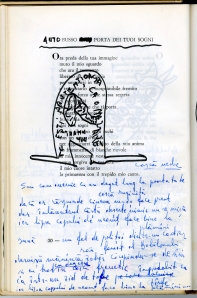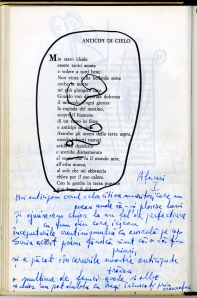One of the more curious items to come to light during the unpacking of the Raymond Danowski Poetry Library was a volume of poems in Italian called L’alito eterna by the obscure Italian poet Renata Pescanti Botta. What made this book so intriguing was that the margins and empty space in the first half were filled with hand-written verse and illustrations in Romanian and the cover bore the manuscript title Femeia neagră a unui culcuş de hoți. The only clue to its authorship was the hand-written name “Andrei Codrescu” on the cover.
The book sat on a shelf for a few years until I came across it in 2006 and decided to investigate this puzzling item. The first step was to work out what I had. I guessed that the manuscript poems were by the Romanian-American poet Andrei Codrescu, well known for his commentaries and reporting for National Public Radio, but I wondered whether his verse was merely a translation of the Italian or original work. Thankfully a faculty member at Emory is fluent in both Romanian and Italian so I took the work to Dalia Judovitz, National Endowment of the Humanities Professor of French and Comparative Literature, who was able to tell me that the poems were original work and were, in fact, amusing riffs on the original Italian poems.
With this knowledge I decided to contact Codrescu directly. He is MacCurdy Distinguished Professor of English at Louisiana State University so his email was easy to find from the university’s website. He replied to my email almost instantly and was very excited to discover this relic from his past though he had only a vague recollection of it. I sent a photocopy to him and his memories returned. He left Romania at age 19 in 1965, traveling via Rome to arrive in the United States in 1966. This book was one that he acquired during his stay in Italy and brought with him to the United States. The poems were written during this period and, as such, are some of his earliest works. He had kept copies of some of the poems but many were unknown.
Copies of the photocopy I had supplied to Codrescu eventually travelled to his editor in Romania where there was great excitement over the discovery of such early work by a well-known Romanian writer. The manuscript poems were transcribed and publication was planned. When the editor saw the colorful illustrations that the youthful Codrescu added to the text then a full digital scan of the work was sent to Romania to be published in addition to the transcribed poems. The end result was the publication of the work in October 2007 by Editura Vinea of Bucharest in a handsome volume with a foreword by the prominent Romanian poet Ruxandra Cesereanu.
This was certainly one of my most satisying discoveries. I would never have guessed when I pulled the book off the shelf that it would lead to a copy of it being published in Romania.
David Faulds


